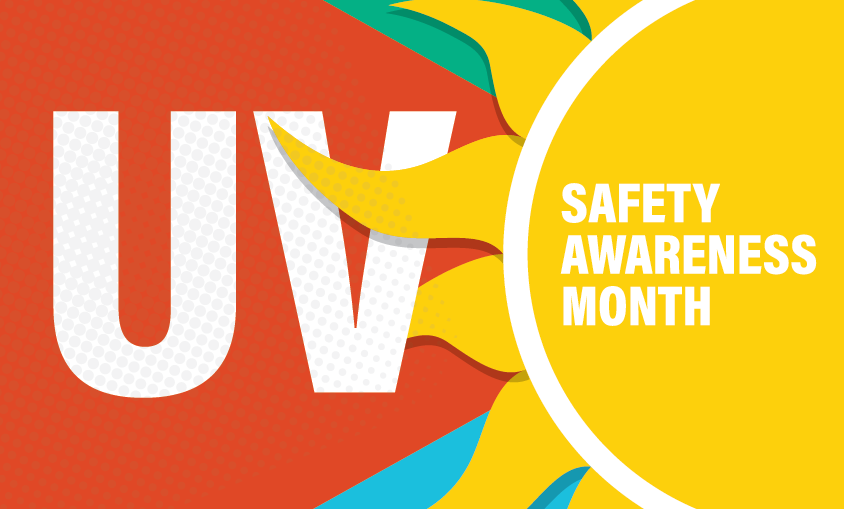July is known as Ultraviolet Safety Month. During this time, the mission is to spread awareness about how important it is to protect our eyes and skin from the side effects of UV rays.
Summer has arrived and with the sun shining brightly, it’s a golden time to highlight July as UV Safety Awareness Month! We all love to take in those warm summer rays, but everyone must remember to protect their skin and eyes from the damaging effects of the sun.
Sun safety is always in season. It’s important to protect your skin from sun damage throughout the year, no matter the weather. Why? Sun exposure can cause sunburn, skin aging (such as skin spots, wrinkles, or “leathery skin”), eye damage, and skin cancer, the most common of all cancers.
If you’re in your 20s or 30s, you probably don’t spend much time thinking about your eye health. But this is the exactly the time you should be acting to preserve your vision. Most vision problems are preventable with simple good-health habits. Vision loss is not an inevitable part of getting older. Many studies have shown that exercise and a diet rich in a variety of fruits and vegetables can protect against blinding eye diseases, such as age-related macular degeneration and glaucoma. However, it is not wise to wait until you’re having problems with your vision to start taking care of your health.
The sun emits radiation known as UV-A and UV-B rays. Both types can damage your eyes and skin:
- UV-B rays have short wavelengths that reach the outer layer of your skin
- UV-A rays have longer wavelengths that can penetrate the middle layer of your skin.
By learning the risks associated with too much sun exposure and taking the right precautions to protect you and your family from UV rays, everyone can enjoy the sun and outdoors safely.
Fortunately, there are things you can do to minimize the risk that comes with sun exposure:
- Cover up. Wearing a hat (preferably wide-brimmed) or other shade-protective clothing can partly shield your skin from the harmful effects of UV ray exposure. Wear sunglasses (even when it’s cloudy).
- Stay in the shade. The sun’s glare is most intense at midday. Staying in the shade between the hours of 10 a.m. and 4 p.m. will further protect your skin. The sun can still damage your skin on cloudy days or in the winter. For this reason, it is important to stay protected throughout the year.
- Choose the right sunscreen. This is extremely important. The U.S. Food and Drug Administration’s (FDA) new regulations for sunscreen labeling recommend that your sunscreen have a sun protection factor (SPF) of at least 15, and should protect against both Ultraviolet A (UV-A) and Ultraviolet B (UV-B) rays. According to the National Council on Skin Cancer Prevention, most people apply only 25-50 percent of the recommended amount of sunscreen. When out in the sun, it’s important that you apply at least one ounce (a palmful) of sunscreen every two hours. You should apply it more often if you are sweating or swimming, even if the sunscreen is waterproof.
- Be aware of eye fatigue. If you spend a lot of time at the computer or staring at your phone, you may forget to blink — and that can tire out your eyes.
- Know your family history. Certain eye diseases can be inherited. If you have a close relative with macular degeneration, you have a 50% chance of developing this condition.
- Take proper care of contact lenses. Sleeping, showering and swimming in contact lenses increases your risk for a potentially blinding eye infection.
- Talk to your healthcare provider. If you are having any problems after being in the sun, be sure to talk to your healthcare provider.
Be consistent. Wear or use a broad spectrum sunscreen every day to protect your skin from the harmful effects of the sun. Apply generous amounts of sunscreen, especially when you are active outdoors. Use a water-resistant sunscreen when swimming or sweating and always choose a sunscreen that offers an SPF of 30 or higher. Enjoy the outdoors this summer and remember to protect the eyes and skin you’re in!
Disclaimer: Health experts suggest that you talk to your doctor before you start, change or modify your medications, lifestyle or current treatment regimen.
References
Seldomridge, D.L. (2019). Take Care of Your Eyes Now for Good Vision Later in Life. Retrieved from https://www.aao.org/eye-health/tips-prevention/healthy-lifestyle-now-good-vision-later
Tips to Stay Safe in the Sun: From Sunscreen to Sunglasses | FDA
U.S. Department of Veterans Affairs (2016). UV Safety Awareness Month. Retrieved from https://www.va.gov/QUALITYOFCARE/education/UV_Safety_Awareness_Month.asp

